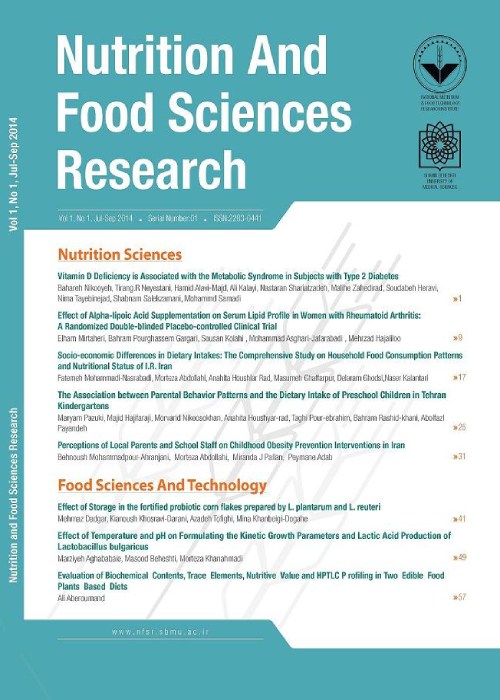Diet-Therapy in Pediatric Crohn's Disease: A New Approach
Author(s):
Article Type:
Editorial (دارای رتبه معتبر)
Abstract:
nflammatory bowel disease (IBD), including ulcerative colitis (UC) and Crohn's disease (CD), has become one of the most common chronic conditions all over the world. The prevalence of IBD is growing rapidlyin developing countries along with nutrition transition. IBD affects children as well as adults, with 15-20% of patients being diagnosed during childhood. The onset of disease during childhood is important because it affects child growth and development (1, 2). Moreover, when IBD initiates during childhood, it is usually more severe and involves more regions of the gut. Weight loss, failure to thrive, low bone density, and late puberty are the typical problems in pediatric CD due to malnutrition which subsequently results in malabsorption. Treatment by corticosteroids aggravates growth problems and worsens malnutrition in the affected children. Currently, exclusive enteral nutrition (EEN) is recommended as the first line of treatment in pediatric CD (3). Meta-analysis of clinical trials has shown that EEN is as effective as corticosteroids in giving rise to remission in children suffering from CD, with 80% success of active CD treatment (4). If patient does not respond to EEN after 2 weeks, other therapeutic options should be considered. If two weeks administration of EEN induces remission, EEN should be continued for 6-8 weeks. Then, solid foods can be introduced gradually to the patient's diet during a period of 2-3 weeks. The first group of solid foods, which can be consumed, are low fiber grains such as white flour bread, crackers, pasta, and rice. After 3-4 days, low fat meats and alternatives such as plain (not fried, not processed) lamb, veal, beef, chicken, turkey, fish (low fat), tofu, and eggs can be used. From the tenth day, low fiber fruits and vegetables such as fruits without skin/seeds, cooked vegetables without skin/seeds can be eaten. Finally, low fat dairy products are added to the diet on the fifteenth day, and gradually patients can use a regular diet as tolerated. For maintenance, patients can use EEN in one out of every 4 months in the year or be fed nocturnal partial enteral nutrition (PEN) for 4-5 days every week (3, 5).
Current evidence has shown that neither type of the formula nor the location of gut injury is a determinant of the effectiveness of EEN for CD treatment in children. If patient prefers to drink formula, then polymeric formulas are good choices for feeding. When the child cannot drink the whole volume of dietary needs, the patient can be fed by naso-gastric (NG) tube (6).
The mechanism of action in EEN treatment of CD has not yet been fully elucidated, however, the probable mechanisms includes low allergen load, absence of food additives, being nucleotide free, and an anti-inflammatory lipid composition. Recently, it has been hypothesized that EEN has a specific effect on the intestinal microbiome, positively interfering with the dysbiosis in CD patients (3, 5, 7). Further studies are needed to evaluate the exact mechanism of action of this treatment. Moreover, producing high quality formulas with good taste and low price are absolutely needed in low income countries because the cost of long EEN is not affordable for many patients in these countries.
Current evidence has shown that neither type of the formula nor the location of gut injury is a determinant of the effectiveness of EEN for CD treatment in children. If patient prefers to drink formula, then polymeric formulas are good choices for feeding. When the child cannot drink the whole volume of dietary needs, the patient can be fed by naso-gastric (NG) tube (6).
The mechanism of action in EEN treatment of CD has not yet been fully elucidated, however, the probable mechanisms includes low allergen load, absence of food additives, being nucleotide free, and an anti-inflammatory lipid composition. Recently, it has been hypothesized that EEN has a specific effect on the intestinal microbiome, positively interfering with the dysbiosis in CD patients (3, 5, 7). Further studies are needed to evaluate the exact mechanism of action of this treatment. Moreover, producing high quality formulas with good taste and low price are absolutely needed in low income countries because the cost of long EEN is not affordable for many patients in these countries.
Language:
English
Published:
Nutrition & Food Technology Research, Volume:5 Issue: 2, Apr-Jun 2018
Pages:
1 to 2
magiran.com/p1812731
دانلود و مطالعه متن این مقاله با یکی از روشهای زیر امکان پذیر است:
اشتراک شخصی
با عضویت و پرداخت آنلاین حق اشتراک یکساله به مبلغ 1,390,000ريال میتوانید 70 عنوان مطلب دانلود کنید!
اشتراک سازمانی
به کتابخانه دانشگاه یا محل کار خود پیشنهاد کنید تا اشتراک سازمانی این پایگاه را برای دسترسی نامحدود همه کاربران به متن مطالب تهیه نمایند!
توجه!
- حق عضویت دریافتی صرف حمایت از نشریات عضو و نگهداری، تکمیل و توسعه مگیران میشود.
- پرداخت حق اشتراک و دانلود مقالات اجازه بازنشر آن در سایر رسانههای چاپی و دیجیتال را به کاربر نمیدهد.
In order to view content subscription is required
Personal subscription
Subscribe magiran.com for 70 € euros via PayPal and download 70 articles during a year.
Organization subscription
Please contact us to subscribe your university or library for unlimited access!


